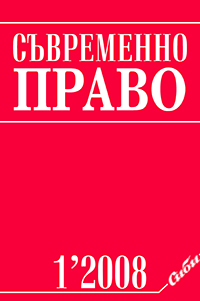Регулиране на обществените и частните интереси при изпълнение на държавната служба според законодателството на Република Латвия
Regulation of the Public and Private Interests in the Execution of Civil Service under the Legislation of the Republic of Latvia
Author(s): Ivan GeorgievSubject(s): Law, Constitution, Jurisprudence, Civil Law, International Law
Published by: Софийски университет »Св. Климент Охридски«
Summary/Abstract: Civil service is one of the main sectors in which no exceptions from the rule of primacy of public over private interests are allowed. The cases of corrupt behaviour that surfaced frequently in the public sector, made necessary the creation of codes of ethics. Many states passed specific laws that laid down in detail rules about the work of civil servants and in particular rules about safeguarding the public interest. Foreign legislation in the management of the conflict of interests area has been developing very rapidly, but not in our country. It is important to note that this should not be considered as a setback of Bulgarian legislation, because the existence of a specific substantial law in no way guarantees its effectiveness. This article essays to make known one of the most detailed laws in force in Europe, in the management of the conflict of interests area — the Latvian one. The analysis shows the interesting and singular approach of the Latvian legislator and in the same time notes some controversial points in the legal regulation. The law introduces different limitations for receiving donations and gifts, for engaging in commercial and advertising activity, as well as for the using of official information, etc. An obligation is also introduced for filling detailed declarations disclosing financial information and property ownership by the civil servants. A substantial deviation from the due procedural principles is the reversal of the burden of proof. It is stipulated that if the civil servant does not prove a legitimate origin of some assets, an irrefutable presumption operates that they are produced by illegal activity. At the end of the article some conclusions are made concerning the advantages and disadvantages of the Latvian law.
Journal: Съвременно право
- Issue Year: 2008
- Issue No: 1
- Page Range: 45-58
- Page Count: 14
- Language: Bulgarian
- Content File-PDF

